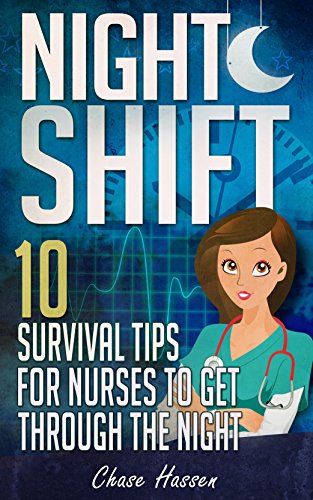More likely than not, you’re going to be offered a night shift position after graduating from nursing school.
You’re going to be told that’s the best shift for new nurses. Is it?…Is it really? Let’s talk about it.
*Disclosure: This article on is night shift better for new grad nurses may contain affiliate links. If you click and make a purchase, I may receive a commission. For more info, please see my disclaimer.
Is Night Shift Better for New Grad Nurses?
Working nights allows new grad nurses to learn at a slower and less chaotic pace than dayshift while getting the premium night shift differential pay. The downside is that the new nurse may struggle with the night shift schedule (i.e., have issues staying up at night and sleeping during the day).
Regardless of your feelings about nights, the truth of the matter is that you likely won’t have a choice.
Many departments like to start a new graduate nurse working the night shift (aka 3rd shift or graveyard shift). There are several reasons for this, and I’m going to discuss them below.
Why You Won’t Have a Choice as a New Grad
1. More Nurses Want to Work on Days
I think it’s not surprising that most nurses dislike working nights and would rather work the day shift.
Every nurse wanting to work the same shift leaves the facility with a problem. All nurses can’t work days because who would provide patient care at the hospital during the night.
To handle this issue systematically and fairly, most facilities resort to hiring new nurses (this includes recent grads and experienced nurses who are new to the facility) on nights and then letting their current night staff go to days as it becomes available. The facility determines whose turn it is to go on days based on seniority.
Seniority
Who’s been at the department or facility the longest. Different facilities might calculate seniority slightly differently.
As the new nurse coming on to the unit, you’re going to be at the bottom of the totem pole, so you would have to start at night and then wait your turn.
Depending on your unit, it could be a couple of months to a couple of years before your turn arrives. This is of course taking into account the staff turnover rate and how many nurses are ahead of you.
Pro-Tip
In situations like this, it’s not just the new nurses who are stuck on nights for a while but new hires in general.
Something else to keep in mind is to be careful of situations where the facility (despite their current staff nurses’ frustration) hires new applicants to a day shift nurse position skipping everyone just because they’re short-staffed.
2. Night Shift is Better for New Nurses to Learn
The other argument nurse managers use to place a new graduate nurse on nights is the assumption that nights will be easier for new nurses to learn and get acclimated to being a nurse.
Here are some of the reasons why they believe that
- Fewer orders that come through at night
- Fewer procedures and labs that you have to take patients to at night
- Overall a slower pace
From my experiences, those points are very valid, but you can’t ignore some of the significant disadvantages new nurses will have working nights.
Related: 10 Tips for Working 12 Hour Shifts
Disadvantages of Working Night Shift for New Nurses
1. Less People Around When You Need Help
I have several issues with the assumption that night shift is better for new grad nurses.
The first is the assumption that night shift is slower-paced than day shift. To some extent, that’s true.
You don’t have to run around with the treatment team coming through and writing orders. You don’t have to deal with constantly taking patients to procedures, and there are usually fewer questions you have to answer from friends and families.
All of that is true. It’s a slower-paced shift. But guess who also knows it’s slower-paced…the facility. They know that, therefore they staff it accordingly.
You usually have fewer people around in case of emergencies. When I was working night shift, I couldn’t tell you how many times we needed more help, but there weren’t enough people around.
2. You’ll Struggle if You Can’t Work Nights
It doesn’t matter how many benefits I give you about working nights. All of that doesn’t matter if you struggle to sleep during the day and stay awake during the night. It doesn’t matter if you start getting into sleep deprivation or your health starts deteriorating.
Not everyone handles working the overnight shift, and I am one of those nurses who can’t handle it. When I was made to go nights, it was some of the worst times of my nursing career.
I couldn’t sleep during the day. I was constantly tired during the night. I was miserable. Just miserable. All I could think about 24/7 was how tired and sleepy I was but just couldn’t sleep.
Make the Best of It
To be fair, your experience could easily be different from mine. You could be one of those nurses who work nights for years because they love it and the extra pay that comes with it.
If that’s you, thank goodness for nurses like you because I don’t want to work nights. If it isn’t you, unfortunately, you probably won’t have much of a choice, so try to make the very best of it.
I have some great resources on working night shift you should definitely check out.
Helpful Working Night Shift Articles to Check Out
- 10 Tips for Drive Home After Working Nights
- Night Shift Nursing: 15 Survival Tips
- Day Shift vs Night Shift


